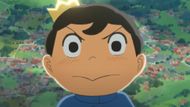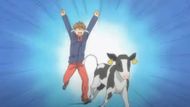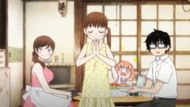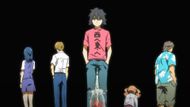Coming-of-age anime remakes ordinary teenage struggles into extraordinary storytelling experiences. The magic transpires when creators incorporate supernatural elements with raw human sentiments. Each story becomes a mirror reflecting our own messy journey toward adulthood.
These ten series prove that maturing stories surpass cultural boundaries and speak directly to the heart.
Disclaimer: This entire article is based on the writer's opinion. Readers' discretion is advised.
1. Mob Psycho 100

Shigeo "Mob" Kageyama might be the world's most powerful esper, but he can't master his own emotions. His psychic blasts mirror ordinary teenage outbursts, except with devastating supernatural outcomes. Mob desperately wants normalcy - friends, romance, and acceptance from his peers rather than fear.
This anime series brightly uses psychic powers as conceits for adolescent struggles. Mob's journey toward expression and genuine connections transforms him from a lone powerhouse into a confident young man.
2. Ranking of Kings

Prince Bojji tolerates mockery for his deafness and muteness. Nobody thinks this small, kind-hearted royal can rule effectively. Yet Bojji's resolution burns brighter than any sword, forcing him to prove his worth via compassion rather than conquest.
Bojji's adaptation unfolds alongside his shadow companion Kage. Together, they uncover that leadership requires empathy, not just strength. The prince learns to balance his gentle nature with essential authority.
3. Clannad

What begins as an unusual high school romance grows into something profound when Tomoya meets Nagisa. Their sweet affair feels innocent until life throws real challenges their way. Marriage, parenthood, and loss test their relationship beyond teenage understanding.
Anime Clannad's second season, After Story, devastates emotionally while teaching harsh adult lessons. The series doesn't sugarcoat how relationships require constant work and sacrifice. Tomoya's evolution from cynical delinquent to devoted father illustrates that coming-of-age never truly ends - each life stage demands new growth.
4. Kids on the Slope

Kaoru Nishimi, in 1966, faced the hardship of constant relocation and persistent social anxiety. Everything changes when he discovers jazz music through the rebellious Sentaro. Their unlikely friendship blooms over shared drum sessions and late-night jam sessions.
Jazz becomes their universal language, expressing emotions too complex for words. The nostalgic 1960s setting amplifies every teenage feeling - first crushes, broken friendships, and family expectations.
5. Hunter x Hunter

Gon Freecss shines with unwavering resolve in his quest to find his missing father. His youthful curiosity and steadfast optimism guide him through his first adventures. But each challenge strips away layers of innocence, revealing the world's darker truths.
The Chimera Ant arc marks Gon's most dramatic transformation. His encounter with ultimate evil forces him to abandon his moral compass temporarily. This moral complexity elevates the series beyond typical shonen territory, showing how coming-of-age sometimes requires confronting our capacity for both good and evil.
6. Silver Spoon

City-raised Yuugo Hachiken enrolls in a farming school to break free from crushing academic pressure. He anticipates a simple path but soon learns farming requires total commitment—physical effort, emotional endurance, and sincere compassion for life. Initial culture shock gives way to profound respect for rural life.
Hachiken learns in the anime that food production connects directly to responsibility and sacrifice. Seeing animals grow from birth to their end teaches him the genuine rhythm of life. His sheltered city outlook crumbles, giving way to respect for hard work and the fulfillment found in caring for living beings.
7. Assassination Classroom

Class 3-E receives an impossible mission: kill their alien teacher before he destroys Earth. Koro-sensei moves at Mach 20 but spends patient hours helping struggling students understand math problems. This paradox defines the entire anime series - a destroyer who nurtures growth.
Students learn that their perceived failures make them unique. Koro-sensei’s unusual approach to teaching fosters self-belief while teaching lessons applicable beyond the classroom. The countdown to his death adds haste to every moment, making each lecture precious and transformative.
8. March Comes in Like a Lion

Rei Kiriyama rises in the world of professional shogi while wrestling with crushing isolation. His talent makes money and recognition, but cannot fill the hole left by family tragedy. Living alone at seventeen intensifies his depression and disconnection from normal teenage experiences.
The Kawamoto sisters offer something life-changing: care and kindness given freely, without expectations. Their warmth in the anime melts Rei's defensive barriers slowly. Simple acts like sharing meals and homework help teach him that accepting love isn't a weakness.
9. FLCL Anime

Twelve-year-old Naota desperately acts mature until Haruko strikes his facade with a guitar to the skull. Her chaotic existence unleashes robots from his head and forces him to face his pretentious behavior. FLCL anime pitches subtlety out the window, picking visual metaphors that hit like freight trains.
The series honors immature confusion via surreal imagery and manic energy. Growing up doesn’t mean erasing the child within you. Naota learns that adultness means accepting both responsible and playful aspects of personality.
10. Anohana

After Menma’s untimely death, childhood friends drift apart, burdened by guilt and unresolved grief. Years later, her spirit returns to ask for help with an unfinished wish. The group must reunite despite growing on different paths and carrying resentment about their shared trauma.
Anime Anohana examines how loss can halt emotional growth during pivotal stages of life. Each friend coped differently - some through withdrawal, others through overcompensation. Helping Menma find peace requires confronting their own arrested development.
These coming-of-age anime series dig deeper than surface-level amusement by confronting omnipresent growing pains. They change awkward teenage moments into profound quests of identity, purpose, and connection. Each story proposes a different lens through which to examine the messy, beautiful cycle of becoming an adult.
